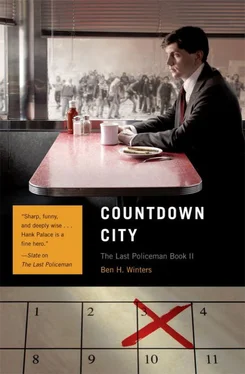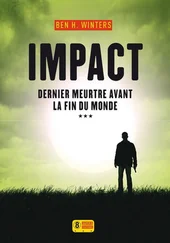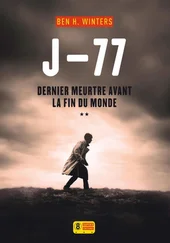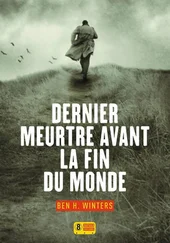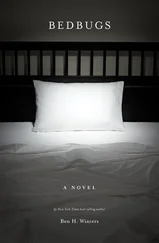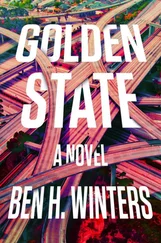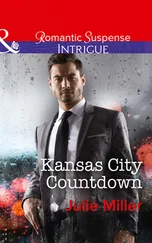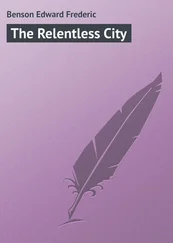“A hospital.” I find the words in my throat and pronounce them gravely, lecturing myself, stern. “Forget the guns. Forget about Brett. Get to a hospital.”
I look out at Route 103, where the asphalt is melting in the sun, letting off a blackish gummy steam. I’m swaying on my feet. The green pages of the stapled EMT booklet flutter in the wind before me, the all-caps text informing me that my dizziness will escalate from mild to extreme. In four hours the pain will begin to ease, as my soft tissue runs out of blood and the arm begins to die.
I’m staring vacantly at the bike and I realize that my decision has been made. It’s already too late. The idea of hopping on a bicycle right now and getting myself to a hospital, to any hospital, is ridiculous. It’s insane. It was already too late half an hour ago. I can’t ride a bike . I can barely walk. I laugh, say the words aloud:
“Henry, you can’t ride a bike .”
I look back over my shoulder. Brett’s corpse is still lying out there, facing up toward the sun. The missing-person case must be declared unsuccessful. I know why he left, yes, and even where he went, but he’s dead and I couldn’t protect him from dying.
I do, however, have some thoughts about who might have shot him, a few stray and feverish ideas on the subject.
* * *
It takes forty-five miserable and crawling minutes to retrace my steps—all the way down the length of the parking lot—through the stone archway back into the fort proper—across the spongy terrain to the foot of the blockhouse. The pain only gets worse now, never better, intensifying as it gains in territory, colonizing the farthest reaches of my body. By the time I reach the wavering shadow of the blockhouse I’m breathing unevenly, bent over, deteriorating in speeded-up motion like a man dying of old age in a cartoon. I collapse and land on my wounded right arm and shriek like a child from the electric pain and roll onto my back under the dangling rope ladder and the sheer wooden side of the building.
I stare up at that ladder. The thick hempen rungs I recently clambered down, just behind Brett, seemed like child’s play an hour ago, like one of the playground structures we used to tear around on in White Park. Now it’s a rock wall, a mountain’s face that I am somehow supposed to drag myself up, exhausted and one-handed.
I stand, slowly, look upward and squint. The sun is burning the top of my head.
“One,” I say, and take a deep breath and grunt and haul my entire weight with my one good arm, lift myself just enough to get my footing on the second rung of the ladder.
Then I wait there, gasping, barely three feet off ground level, with my head tilted up and my eyes closed, sweat pouring off of my scalp and pooling in my collar line. I wait for strength—for—I don’t know—a few minutes? Five minutes?
And then I say: “Two.”
Breathe—steady—grunt—heave. And then three—and then four—again and again, finding my footing on each new rung, humping myself laboriously upward and then exhaling—and waiting—panting—the sun baking me against the wall—sweat running down my spinal column and my arms, gathering in my waistband and swamping my armpits.
Halfway up the ladder, at rung number ten, I conclude that this is, in fact, impossible. I won’t get any farther. This is as good a place as any to die.
I am too tired and too hot and too thirsty—increasingly it is my thirst that is the main problem, superseding the exhaustion and the dizziness and even the nascent feverishness—superseding even the pain, heretofore the great champion among my tormentors. I have forgotten, at this point, just what I am hoping to find up there in the blockhouse, what if anything.
Doesn’t matter. I am too tired and too impaired and too thirsty to keep going. I will die here, plastered with sweat and crusted blood against this two-centuries-old wooden building, burned into the side by the afternoon sun. Here Maia will find the empty shell of my body and carry it away to sea.
The dog barks at the foot of the building. I can’t see him, of course. But I hear him. He barks a second time, loud and sharp.
“Hey,” I say, the word drifting feebly off in the air like a dead leaf. I clear my throat, lick my lips, and try it again. “Hey, boy.”
Houdini keeps barking, probably because he’s hungry or scared or maybe just happy to see me, even my long spindly bottom half. He’s probably been lost in the woods, chasing squirrels or being chased for the last two hours. But in my dizziness and fatigue I imagine his frantic yips as encouragement: He is insisting that I continue up, that I assault the next rung and the next.
My little dog has reappeared at the crucial moment to insist in his rough canine language that salvation waits at the top of the ladder. I keep going. Up I go.
* * *
When at last I’m on the floor of the blockhouse I just lie there for a while, coughing. My throat is shutting down, collapsing in on itself like a dusty mineshaft. I roll over when I can and crawl to the trunk under the cannon and manage to open it and find a two-gallon jug and heave the heavy thing to my lips and drink like the lost man in the desert, letting water spill out and soak my face and my chest. I come up for breath like a surfacing dolphin and then drink more.
I let the empty plastic jug drop from my hands, and it bounces with a hollow sound on the wooden beams of the blockhouse floor.
Then I go back to the trunk, and a minute later I’ve found it. The pink paper, buried—not even buried—half hidden at best, beneath a change of clothes and a flashlight, a single sheet of pink notebook paper, worried and blackened at the edges where Brett’s fingers, stained with dirt and gunpowder, have picked at its corners. Folded and grimy but still bearing the faint smell of cinnamon.
I laugh out loud, a nasty dry rasp. I take the page from Martha’s diary and wave it in the air, pump it crumpled in the fist of my working hand. The page is torn and jagged at one edge, ripped out as if with force. I look up at the roof of Brett’s cloister and press the paper to my chest and grin, feeling the grime on my face crack and fall away. I read it and reread it, and its meaning starts to well up around me, and then I’m getting dizzy and cold, so I press the torn-out scrap of notebook paper to my chest and lean back against the old wooden wall and shut my eyes.
* * *
He’s barking, down there. Houdini is shouting, beautiful and faithful creature, hollering to keep me awake, or maybe at some interesting clouds, or maybe he’s just giving his little voice box a workout, as dogs are famous for doing.
I should —I open my eyes, stare at the opposite wall, struggle to form the thought— I should check on him . I roll from sitting down onto my belly and crawl back to the doorway. The arm is starting not to hurt, which though a relief is nevertheless a very bad sign. I peer over the edge, and there he is, barking, purposeful, sending his voice up along the side of the building to where I can hear him, way up here.
“Good boy,” I whisper, smiling down at him.
The sun is lower now and not as bright and I can see clearly where, down at the base of the blockhouse, my dog has built a little pyramid of dead birds. And I am not sure whether this is supposed to be a kind of sacrifice in my honor, or a tribute, or some sort of bizarre enticement: Here, master, here! If you survive this situation, you can eat these birds .
“Good boy,” I say again. “Good dog.”
* * *
It is some time later. If I check my watch I will know what time it is, see how many hours have elapsed with most of my arm cut off from my circulating bloodstream like it’s downriver from a dam, and discover thereby how close I am either to dying or to losing my right arm forever.
Читать дальше
